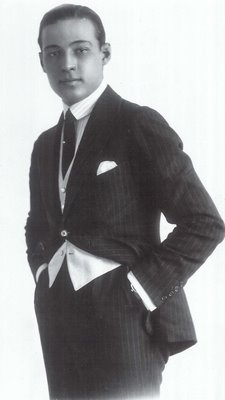

Rudolph Valentino Gets His Start
My eighth grade class staged a program for the school wherein, among other things, we spoofed old-time silent movies. The softest target was, of course, Rudolph Valentino. Everyone young and old could laugh at the Sheik. How did audiences ever take him seriously? My own participation in the show was half-hearted. I had only been exposed to Valentino via photos in Richard Griffith and Arthur Mayer’s book, The Movies, but something suggested there was more to this actor than the absurd caricature we kidded so mercilessly. It’s years later now, and thanks to remarkable recent discoveries, Rudolph Valentino may finally get his belated due. The real surprise among buried treasure is how good he was from the very beginning. A look at The Married Virgin, thought lost until 1995, reveals an actor so assured as to transform not only his character, but also the story itself. Cast as a fortune-hunting scoundrel, Valentino brings nuance and sympathy to a stock role anyone else would have played along standard villain lines. You know a player is good when he keeps you wondering how the show is going to turn out, even where you know all along how it’s got to turn out. Valentino spent three or so years transcending stereotypes and defying efforts at typecasting. Rudy’s scoundrels were above simple acts of perfidy. He worked against cliches inherent in these stories and often overcame them. There are layers of yearning and complexity reflecting an offscreen life in close parallel with rogues he impersonates. His own dalliances with scandal and crime prepared Valentino for parts like these. Perhaps Rudy was dramatizing incidents experienced on the fringes of a New York society he had inhabited just a couple of years before. In those early days of the twentieth century, a man could still escape an unsavory past and begin anew…
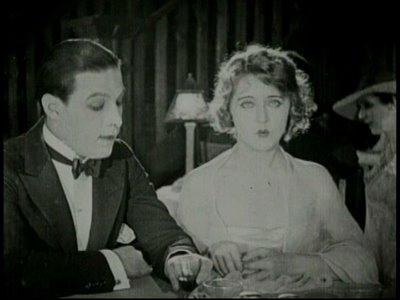

Valentino did not come of peasant stock, as some biographers would maintain. If anything, he was overindulged as a boy. The father’s death when Rudy was 11 left him without direction or discipline, an indolent lifestyle seeming to loom before him. Rudy wanted to amount to something, and toward that end, talked his mother into staking passage to New York at the age of 18. Picking up English where he could, it would become the fourth language he would master. Rudy liked the high life, and was quite the pretender within a social structure where appearance was everything. He made friends easily. Hanging around cabarets feigning status was all well and good until the money ran out, then it was odd, often menial jobs, plus overnights on a park bench. Rudy had a way with popular dances and made himself available for afternoon tango teas where women of means paid for swirls around the floor with handsome, exotic strangers. People liked Rudy and wanted to help out, even where he fouled himself up. Trouble sometimes arose from his own good intentions. An effort to assist a society doyen in shedding an unwanted husband made powerful enemies. Rudy served as a witness against the woman’s straying spouse and the man sought revenge. A charge of white slaving lodged against Valentino in 1916 was probably a frame, but it consigned him to The Tombs (New York’s notorious lock-up) for several days and tarnished him among gentlefolk once friends. The finishing touch came when Valentino's divorcee consort went after her estranged mate with a pistol and emptied the chamber into his head. It was time for Rudy to clear out of Gotham.
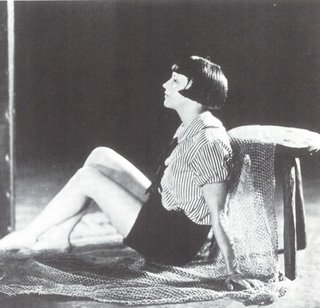


Upon arriving in California, Valentino used his dancing skills to promote a stage career. Success in New York ballrooms might have led to a renewal of those pursuits in Los Angeles, but Valentino shunned the unsavory occupation of dance partner for hire, itself only one step removed from dreaded gigolo status. Movies were the goal he sought, and again, people went out of their way to lend a hand. Big names like Viola Dana, Gloria Swanson, and the Gish sisters were early boosters, but none took notice of Rudy as lothario or swoon artist. This was one performer who would epitomize sex on screen, while assuming a polar opposite image off. For Rudy, it was purely an act. Lounge lizards were a pose Valentino maintained to survive, but being close to roles he assumed in life, they were all the more degrading to him now. Rudy was intent on breaking free of these when writer-producer June Mathis caught his seducer act in Eyes Of Youth and committed herself to promoting him for The Four Horsemen Of The Apocalypse, a proposed special for Metro. Mathis was a capable, but homely, sort --- maybe Rudy was her idea of a perfect lover, while she served as an ideal big sister, something he needed at this juncture. For $350 a week (up from the $100 he got for doing The Delicious Little Devil in 1919), Valentino got the lead in The Four Horsemen, but had to provide his own costumes. The elegant wardrobe he wore throughout was courtesy Rudy’s own New York tailor, and it would take the actor two years to square the tab for those twenty-five custom suits.
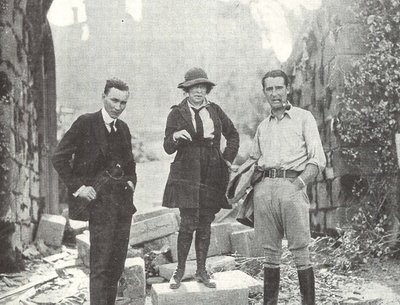
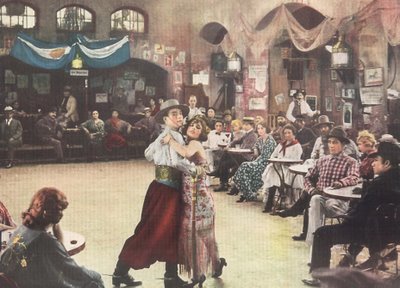
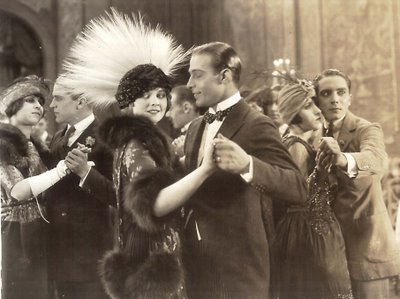
There was marriage to an actress named Jean Acker. She locked him out of the bridal chamber and vows were never consummated. Seems Jean neglected to tell Rudy she was a lesbian. This wouldn’t be his last dance around that maypole. The union was dissolved before he got into big chips, though Valentino seemed incapable of making it work with women in any capacity other than friend. He had a generous bounty of those, plus a coterie of male pals that shared his interest in fast cars and motorcycles. Few in the industry were as popular, and after The Four Horsemen Of The Apocalypse, none so much in demand. What was his performance but a distillation of promise shown in the gigolo ghetto from which he was finally sprung? Pity so many of his early films remain lost, for I suspect there was all sorts of good work that would anticipate the performance he gave in The Four Horsemen. For a picture made in 1921, it still plays remarkably modern, Valentino at all times natural and convincing in the lead. A flamboyant tango backgrounds his grand entrance, and indeed, history tells us this was the moment his star was truly launched. For the five short years he enjoyed as a major name, Valentino would never again be in a picture this big, and certainly not one so successful. The Four Horsemen Of The Apocalypse appears from time to time on TCM. It is a long show, but an epic one, and well worth 131 minutes invested to watch.
Photo Captions
Early Portrait --- Rudolph Valentino
Valentino In The Married Virgin (1918)
With Mae Murray in The Delicious Little Devil (1919)
Valentino in Eyes Of Youth (1919)
Portrait of Jean Acker, Valentino's first wife
Valentino as Julio in The Four Horsemen Of The Apocalypse (1921)
Six-Sheet Poster for The Four Horsemen
Cameraman John Seitz, writer/producer June Mathis, and director Rex Ingram on location for The Four Horsemen
Valentino performs his famous tango in The Four Horsemen
With Alice Terry in The Four Horsemen
A great website devoted to Rudolph Valentino can be found HERE.
8 Comments:
During my freshman year in college, I took a friend to see a university screening of The Son of the Sheik. It was a revelation; she came out of the auditorium literally staggered: "You know, to be honest, I thought this was going to be old-fashioned and quaint, and even a little funny, but wow! That man really had something!"
I finally caught up with The Four Horsemen of the Apocalypse when it came out on laserdisc (with Carl Davis's splendid score), and I do think it's one of the all-time classics, a rather startling reminder of how early the big-studio blockbuster established itself as a force to reckon with in Hollywood. As good as Valentino was, though, I expected that. The surprise for me was Joseph Swickard as Valentino's father; a truly epic performance.
The Four Horseman of the Apocalipse is a fine though not a very good film, although Valentino is great. The scenes in Argentina are a caricature, including the famous tango. I have no idea about how well the film performed in Buenos Aires, although I did manged to rescue an from film exhibitor Max Glücksmann.
I still feel that the story is about big loosers who perfer to abandon their good position.
Anyway, the Argentinean silent fims of the time are much more interesting.
The film is available online at
http://es.arcoiris.tv/modules.php?name=Unique&id=559
Incidentally, Delicious Little Devil is on DVD as a supplement on the disc of Beyond the Rocks. At Cinesation last week, someone said that you'll consider Beyond the Rocks an extra on your disc of Delicious Little Devil once you've seen both....
The most interesting aspect of this film is this Argentinean ad, available only because I rescued it.
http://photos1.blogger.com/blogger/6557/3224/1600/Estreno%20de%20LOS%20CUATRO%20JINETES%20DEL%20APOCALIPSIS%20(Metro,%201921).jpg
I have only seen the one Valentino movie, The Eagle. I wondered if I would see that famous charisma jump through the screen when I watched, or would I see "hammy" acting. I am glad to say that I did not see the hammy acting at all; I found him incredibly sexy and charismatic and I know what all the fuss was about. I wonder if he would have survived the move to Talkies, along I do see you mention a radio broadcast, so maybe he would have, we will never know. By the way do you know if the radio broadcast is available in the public domain?
To Convict 13 --- I understand Valentino did at least one recording, and even sang on another occasion for posterity, but I haven't heard these artifacts (though I'd like to). I did Google for them, but no luck. This posting only covered the beginning of Valentino's career. I'll be doing more entries on this subject in coming weeks, as Rudy's definitely a favorite of mine from the silent era, and a number of his films are accessable on DVD and TCM.
I found a podcast where you can here Valentino sing.
This is not my Podcast, but I am sure that RudyFan would not mind me sending her link.
http://www.rudyfan.libsyn.com/
Go to the April 2006 archive.
Loved your Valentino site. I've be-
come interested in him and collecting
the few items related to him. I think
that like most handsome actors:
Tyrone Power, Errol Flynn for in-
stance, Valentino never really got
his due as an actor. Certainly, at
least as far as this woman is con-
cerned, he was exotic and sexy. Too
bad he had to leave us so early. We
in the 21st century could have bene-
fitted from his talent...and looks.
Post a Comment
<< Home